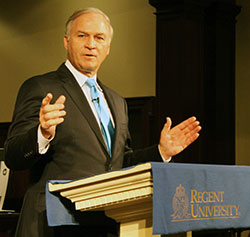
The Honorable J. Randy Forbes Addresses Faculty and Students at A. Willis Robertson Lecture

On Wednesday, September 19, the Honorable J. Randy Forbes, a Regent University fellow and former Virginia and United States congressman, spoke to a group of students and faculty at the annual A. Willis Robertson lecture.
The A. Willis Robertson lecture, hosted by the Robertson School of Government, is a celebration of the legacy of servant leadership and integrity found in Senator Absalom Willis Robertson, the father of Regent’s founder, chancellor and CEO, Dr. M.G. “Pat” Robertson.
Senator Absalom Willis Robertson had a distinguished career marked by leadership and sacrifice. He served in the U.S. Army before going on to represent his fellow Virginians for forty years in the Senate of Virginia, the U.S. House of Representatives, and the U.S. Senate.
“My father was a man of impeccable personal integrity, and he had a work ethic that was extraordinary,” said Robertson of his late father. “He never forgot the fact that he was a servant of the people, and the concerns of his constituents were foremost in his mind.”
In January 2017, Forbes became a Regent University fellow — a timely addition to the university’s leadership. With the launch of Regent’s Cybersecurity Institute, Forbes will develop a defense industry summit.
“Adding Congressman Forbes to Regent’s faculty roster aligns well with our university’s strategic goals,” said Dr. Gerson Moreno-Riaño, Regent’s executive vice president for academic affairs.
Besides his work as a fellow at Regent, Forbes is also a fellow at the U.S. Naval War College.
In his lecture, “The Future of Public Service in Virginia Politics,” Forbes discussed his own experience in Virginia politics and how people can maintain their beliefs while remaining civil and finding common ground — something he said is becoming increasingly less common.
Forbes said hatred has taken the place of patriotism as the “primary energy in politics.”
He believes if Americans fail to maintain civility within political institutions, the consequences are dire.
“I would submit there is a direct correlation between the reduction in faith and the rise in hatred,” he said. “If we don’t change that, then we are going to have a different America because America is important, it has a destiny, its destiny is to do good in the world, and the essence of America is freedom.”
“The biggest threat to freedom is hatred, because if you have hatred our institutions can’t function,” he added.

